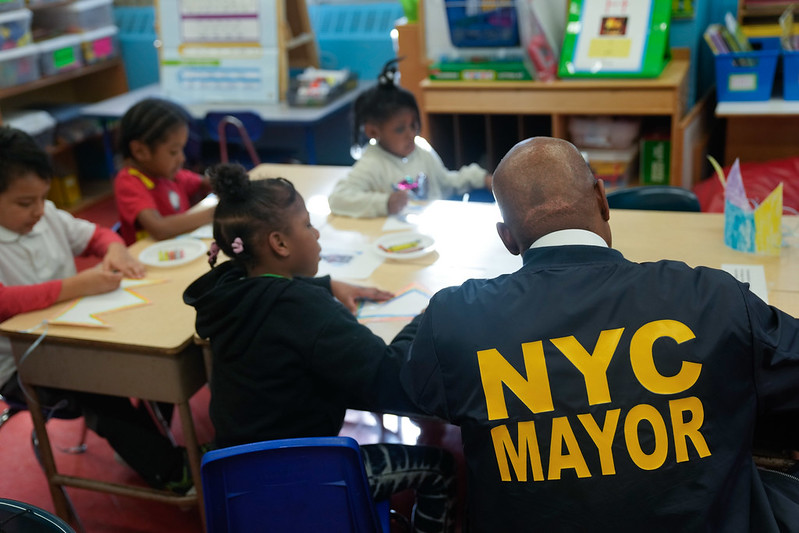
Mayor Adams in school (photo: Michael Appleton/Mayor's Office)
New York City Mayor Eric Adams understands the challenge faced by the city’s nearly 1 million New Yorkers living with a disability – and the importance of diagnosing and addressing disabilities early. It was not until he was in college that he discovered he has dyslexia, with which he has contended all of his life and now informs his policy-making.
Early diagnosis is key, but it must be accompanied by strategies to address the disability. That’s where New York City has an opportunity to set a new, cost-effective, national standard through collaboration among government, the nonprofit sector, and the business community.
Mayor Adams took an important related step when he announced last Spring a plan to screen nearly all public school students for dyslexia, to provide additional educational support to students with dyslexia at 80 elementary schools and 80 middle schools, and to open two dyslexia programs (in Harlem and the South Bronx) with the goal of expanding to all boroughs this year.
In his 2023 State of the City Address, the mayor reported on the plan’s implementation, highlighting, among other developments, “launching the first district school in city history dedicated solely to supporting students with dyslexia, and making dyslexia screenings available in every public school in New York City.”
The greater need, of course, is to address disabilities more broadly defined and to provide services in school to help the tens of thousands of students with disabilities envision and prepare for success in college and career opportunities.
The nonprofit Institute for Career Development (ICD), which we lead, launched in the Fall a two-school pilot program that does exactly that and provides a model that we hope can grow to be citywide. The pilot program was launched in partnership with Discovery High School in the Kingsbridge Heights section of The Bronx and Richmond Hill High School in Queens.
Through the initiative, ICD now has on-site at each school a full-time Navigator available to work with any student who has an Individualized Education Program (IEP) or 504 plan to prepare the student to make the jump to college or vocational training and embark upon a career. The Navigators, whose services in the pilot program are available at no cost to students or schools, will guide students around obstacles and over hurdles as they work to build skills needed to launch fulfilling careers.
There’s a vital role for other nonprofit organizations and the business community in this regard. Scaling will require broader partnerships, and the students will need practical, after-school, work experience. Montefiore Medical Center, for instance, is already providing volunteer service opportunities for the Discovery High School students. At Kingsbridge Heights Community Center, the students are providing support for a community food pantry as well as after-school programming for middle school students.
As students identify specific career ambitions, other collaborations will be needed. Cisco, for instance, partnered with the Mayor’s Office for People with Disabilities and ICD to create the AbilITy Cisco Academy, the first fully accessible computer networking certification program for New Yorkers with disabilities. The Academy offers a variety of training programs where people with disabilities can earn industry-recognized skills and certification. Here, too, practical work experience, including internships, is crucial to demonstrating the students’ capacity to work in challenging settings.
Expanding services early to people with disabilities is vital to helping them get off to a fast start, with a clear sense of direction and the specific skills to propel them, and the need is great in terms of scale and societal impact. Experts estimate that as many as 20% of students are dyslexic, which represents 80-90% of all those with learning disabilities, and more than a third of prison inmates are dyslexic. Those statistics don’t even address other disabilities.
The cost of providing these services can be justified both by the enhanced career trajectories of the students (and related increased income tax revenue) and by societal costs avoided (such as preventable criminal justice involvement). The practical work experiences similarly help nonprofit organizations fulfill their missions and enable businesses to identify potential future employees.
Addressing early the needs of New Yorkers with disabilities is a winning strategy for all. Mayor Adams is pointing the way. The nonprofit sector and the business community should join with the City of New York to make it a priority in the year ahead.
***
Diosdado G. Gica and Joseph T. McDonald III are Co-Presidents of the Institute for Career Development, based in New York City. On Twitter @icd_nyc.
***
Have an op-ed idea or submission for Gotham Gazette? Email This email address is being protected from spambots. You need JavaScript enabled to view it.




